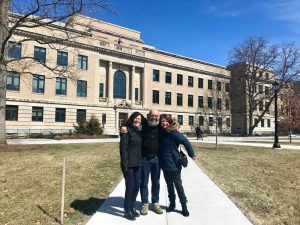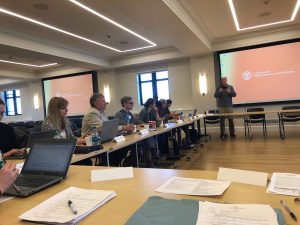Adrienne Attorp blogs about her first academic conference, following a windswept journey to Cornell.
As a first-year PhD student I was not sure what to expect from my first academic conference. The Trans-Atlantic Rural Research Network (TARRN) is “a collaborative network of social scientists in North America and Europe conducting original research on rural transformation and rural policies”. The main aim of the network is to undertake comparative research on rural transformations in the US and UK. Each year the group meets to discuss new and ongoing research being conducting by network members, and to act as a “springboard” for new research that is in line with the network’s aims. I’m told it’s not a “typical” academic conference but it was a great introduction for me, particularly as I was able to give a paper myself. This year the network meeting was hosted by Cornell University in Ithaca, New York, and I attended along with four academics from Newcastle University’s Centre for Rural Economy. Nothing at all against Aberystwyth (last year’s hosts) or Aberdeen (next year’s hosts), but there is something rather exciting about taking a trans-Atlantic flight in order to get to a conference, and I for one was delighted that it was Cornell’s turn. Never mind that a fierce nor’easter shut down the entire eastern seaboard the day most of us travelled over, meaning that more than one of us had to go on a magical mystery tour of European and American airports before finally arriving in Ithaca (I highly recommend Detroit’s airport). We did all get there in the end!
I spent the days leading up to the event preparing to have my underdeveloped ideas torn to shreds by the seasoned academics in attendance, most of whom are leaders in the field of rural sociology. Thankfully, I was spared humiliation; it turns out that TARRN works to actively support new and experienced academics alike, and this meeting was no exception. I am pleased to report I didn’t have any rotten tomatoes thrown at me, nor did anyone tell me I am stupid (I cannot confirm no one thought this, but I choose to remain comfortable in my ignorance). Instead, I received a great deal of thoughtful, constructive feedback, which left me feeling motivated and inspired.
TARRN meetings aim to maximise idea sharing. Participants present ‘think pieces’, each written with a view to stimulating debate and sparking future research. This is followed by round table discussion on the topic – an opportunity for people to ask questions, provide feedback, and suggest ideas for future research and collaboration. There are also short presentations about attendees’ current research again followed by round table discussion. This offered those who wished it an opportunity to receive valuable feedback about their research from their fellow academics. The conference room was abuzz with exciting ideas, and everyone seemed energised.
To me, the TARRN meeting felt like what academia should be about: idea sharing and collaboration, for the benefit of all. For why do we research if not to learn about the world and how it works, in order to help make it a better place? And therefore, if our research is indeed for “the greater good”, should we not, as academics, be helping further each other’s work as much as we can? Perhaps it is naïve of me to believe this. I am aware of academia’s competitive, cut-throat reputation, and maybe after another three years of PhD study I will become jaded. However, I hold out hope, because the TARRN meeting demonstrated to me that academia can be positive, supportive, and collaborative. I am already looking forward to next year’s meeting in Aberdeen, which, although not as exotic as New York, will at least not take two days to travel to.
This blog originally appeared on Newcastle University’s Centre for Rural Economy Website


